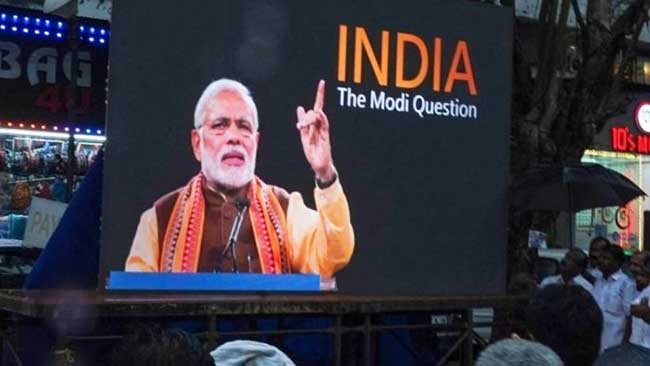The banned BBC documentary 'India: The Modi Question' was screened at the prestigious Film and Television Institute of India (FTII), the students' association informed on Saturday.
The FTII Students' Association (FTIISA) said the documentary was screened on January 26, coinciding with the 74th Republic Day celebrations.
"On 26/01/23, we screened the banned BBC documentary 'India: The Modi Question' at FTII," said an FTIISA statement issued on social media on Saturday.
"Throughout history, banning of literature, music, and in recent times, media, has been a sign of a crumbling society. The act of scrutiny should be welcomed by our elected representatives. Instead, they quickly tag it as false propaganda and try to shove it under the rug. They should know that the most sure-fire way for something to be watched is to ban it," the FTIISA said in the Instagram post.
"However, the BBC documentary barely scratches the surface of the kind of violence that has been perpetuated throughout the country for a dedicated, singular, vicious purpose," the FTIISA added.
"It would be startling to us if anyone in India is surprised by the happenings in this documentary. Communal violence has become a part and parcel of the ruling party's politics," it said.
Meanwhile, it's learnt that the FTII management has initiated a probe into the screening of the documentary on the campus.
Earlier on Saturday, the Tata Institute of Social Sciences (TISS) in Mumbai had called off its planned screening of the BBC documentary, following protests by the Bharatiya Janata Yuva Morcha.
However, though the TISS management had warned against the screening and did not allow the use of projector, the Progressive Students Forum showed the documentary on students' mobile phones, laptops and tablets.




Amit Shah & Akhilesh Yadav’s lighter exchange in LS over party president
Amid the uproar and heated debate between the ruling party and the Opposition over the Waqf Amendment Bill on Wednesday, the Lok Sabha witnessed some lighter moments between Home Minister Amit Shah and SP President Akhilesh Yadav.
Waqf Bill weakens Constitution, defames minorities, divides society: Gaurav Gogoi
As Parliament debated the contentious Waqf Amendment Bill, 2025, on Wednesday, deputy leader of Opposition in the Lok Sabha Gaurav Gogoi came down heavily on the government.
Bill not linked to religion, it’s prospective and not retrospective: Kiren Rijiju flays naysayers
Union Minister for Minority Affairs Kiren Rijiju on Wednesday tore into the Opposition for ‘spreading falsehood’ over the Waqf Amendment Bill and urged the ‘doubters and naysayers’ to refrain from misleading the people on the proposed reforms.
Parliament was being claimed as Waqf property: Rijiju slams UPA for making provisions 'overriding' other laws
Parliamentary Affairs Minister Kiren Rijiju on Wednesday bashed the previous UPA government for de-notifying 123 properties and handing them over to the Delhi Waqf Board.
Bhopal’s Muslims burst firecrackers in support of Waqf (Amendment) Bill
A large number of Muslims in Madhya Pradesh's capital, Bhopal, burst firecrackers on Wednesday to express their support for the Waqf (Amendment) Bill, which was presented in the Lok Sabha earlier in the day.
CPI(M)’s 24th party congress begins in Madurai, veteran leader Biman Bose hoists flag
The 24th Party Congress of the CPI(M) commenced on Wednesday in Madurai, Tamil Nadu, with senior leader Biman Bose hoisting the party flag at the historic Tamukkam Ground.
Vigil strengthened to curb illegal infiltration, human trafficking from B’desh: CM Saha
Tripura Chief Minister Manik Saha on Tuesday said that the state government has taken a series of steps to prevent illegal infiltration from Bangladesh, and the BSF as well as the state forces are on a strict vigil round-the-clock.
70 people convicted in 52 NDPS Act cases in Tripura: CM Saha
Tripura Chief Minister Manik Saha on Tuesday said that the state police have registered 52 cases and 70 people were convicted in the last three years under the Narcotics Drugs and Psychotropic Substances (NDPS) Act 1985.